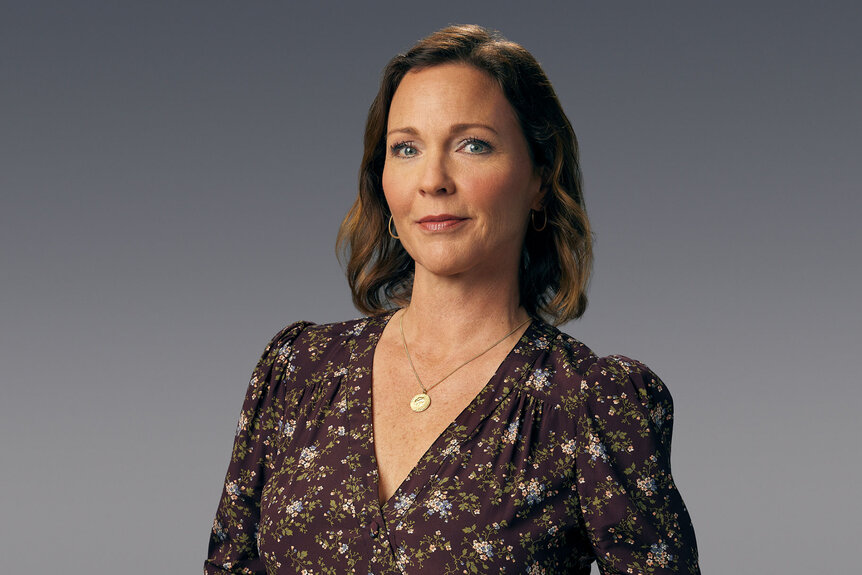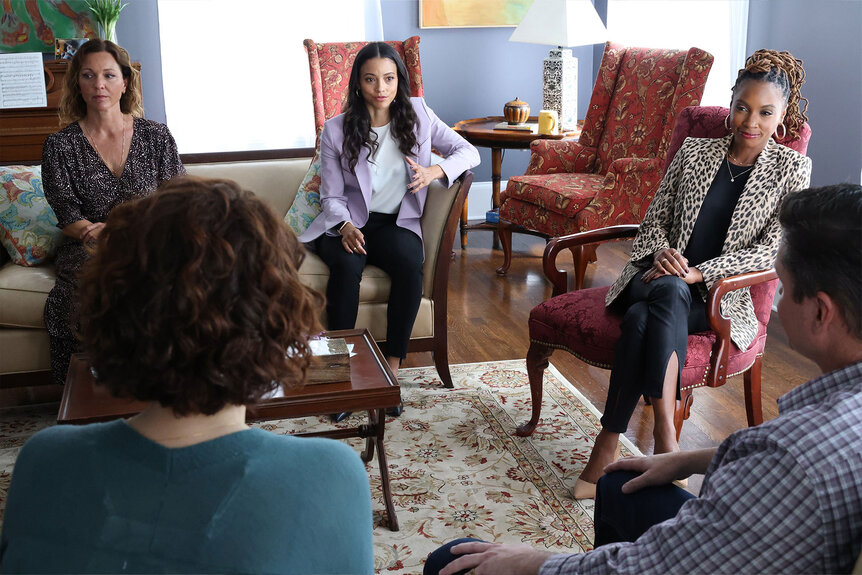Create a free profile to get unlimited access to exclusive show news, updates, and more!
Understanding Margaret Reed's "Superpowers" of Observance in Found
Margaret's ability to turn personal trauma into a helpful tool could be seen as part of post-traumatic growth.
The power of perception can be an essential tool in missing persons cases, especially when wielded by a mother on a mission.
Found, airing Tuesdays at 10/9c on NBC, takes audiences deep into the investigation as P.R. specialist Gabi Mosely (Shanola Hampton) vows to find missing people whose cases don’t get the attention they deserve. Predominantly, she aims to highlight missing persons of color, members of the LGBTQ+ community, indigenous peoples, and others who have “slipped through the cracks.”
Mosely leads a crisis management team, which consists of law school student Lacey Quinn (Gabrielle Walsh), agoraphobic tech whiz Zeke Wallace (Arlen Escarpeta), the emotionally tough Dhan Rana (Karan Oberoi), and the ever-observant Margaret Reed (Kelli Williams).
Margaret brings her hyper-observance to the firm, which others refer to as “a party trick” and a “superpower.” Recognizing familial facial traits and reading body language is just some of what Margaret can do, though, as most superhero tales go, it comes with a tragic background.
RELATED: Shanola Hampton Says Her Character Gabi Mosely on Found Is Swimming in Secrets
Margaret’s Tragic Backstory
As seen in Found’s season premiere, Margaret’s young son, Jamie, disappeared 13 years ago, though the details surrounding his disappearance are slim thus far. After helping her comrades crack the toughest of cases, the grieving mother heartbreakingly retreats nightly to a city bus terminal from where Jamie disappeared.
Margaret settles with a blanket and her son’s kiddie astronaut lunchbox — packed with a meal — and desperately hopes to find her son’s face in passersby. She arms herself with a young Jamie’s photo plus an age-progression composite of what her son might look like today.
Through this tragedy, Margaret developed her power of perception, which assists Gabi and her team find other missing persons.
“Thirteen years, looking for Jamie’s face in the crowd; one day I’ll find it,” Margaret tells Lacey. “Until then, I’ll use my non-superpower superpower to find other faces in the crowd.”
Is being hyper-observant a superpower?
While the existence of superpowers might be up for debate, there’s no doubt that having a keen sense of observance can be both powerful and super. In Margaret’s case, honing in on the small and commonly overlooked details might just be what it takes to find a missing person, especially when up against the clock.
The tool can be helpful when in dangerous situations, analyzing certain scenarios, or even familiarizing oneself with an environment.
RELATED: Is Found's Heroine Gabi Mosely, Who Helps Save Missing People, Based Off a Real Person?
Interestingly, Margaret’s aptitude for observance might be a symptom of trauma or stress, which could be expected in light of her son’s mysterious disappearance. Being overly attentive and perceptive might fall under the category of hypervigilance, which is common in anxiety disorders and P.T.S.D. (post-traumatic stress disorder).
Professionals say some experience hypervigilance when a person has “intense and sometimes obsessive awareness of their surroundings,” oftentimes as a means of assessing threats or planning escape routes, as published in Verywell Mind.
In Margaret’s case, it seems that such hyper-awareness doesn’t impair her day-to-day, and thankfully, she can turn it into a useful tool. If her gift was, in fact, caused by trauma, it’s safe to assume that turning it into a “superpower” might be part of post-traumatic growth.
Turning a negative into a positive
P.T.G. (post-traumatic growth) is defined as “the positive psychological change that some individuals experience after a life crisis or traumatic event,” as published in Psychology Today. It doesn’t occur in everyone who experiences P.T.S.D.; however, it often parallels P.T.S.D. and helps individuals better understand themselves and the world in which they live.
P.T.G. can be seen as the positive counterpart of P.T.S.D., causing some to emerge from a crisis as a stronger and more hopeful person than before. According to the Harvard Business Review, P.T.G. can be facilitated in five ways: Education, emotional regulation, disclosure, narrative development, and service.
Service, it seems, is what we see with Found’s Margaret Reed.
“People do better in the aftermath of trauma if they find work that benefits others — helping people close to them or their broader community or victims of events similar to the ones they have endured,” according to psychologist Richard T. Tedeschi.
Tedeschi wrote that negative experiences “can spur positive change” in people who have endured war, natural disasters, serious illness, and bereavement. Positive changes could include “a recognition of personal strength, the exploration of new possibilities, improved relationships, a greater appreciation of life, and spiritual growth.”
In Found, Margaret — against the odds — turns her tragedy into something she uses as service as part of Mosely’s crisis management team and, hopefully, as a means to resolution in her personal life.
Watch Found Tuesdays at 10/9c on NBC and streaming the next day on Peacock.









